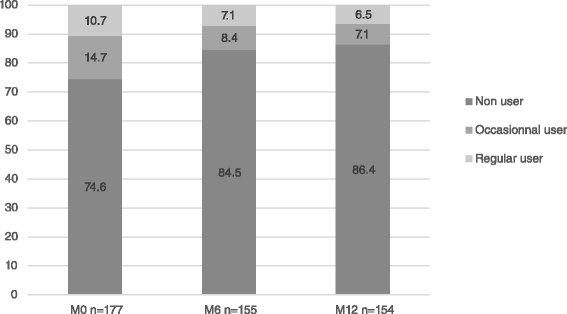Correlates of cocaine use during methadone treatment: implications for screening and clinical management (ANRS Methaville study)
- PMID: 27048152
- PMCID: PMC4822310
- DOI: 10.1186/s12954-016-0100-7
Correlates of cocaine use during methadone treatment: implications for screening and clinical management (ANRS Methaville study)
Abstract
Background: Cocaine use is frequent in patients receiving methadone maintenance treatment (MMT) and can jeopardize their treatment response. Identifying clinical predictors of cocaine use during methadone treatment can potentially improve clinical management. We used longitudinal data from the ANRS Methaville trial both to describe self-reported occasional and regular cocaine use during MMT and to identify clinical predictors.
Methods: We selected 183 patients who had data on cocaine (or crack) use at months 0 (M0), M6, and/or M12, accounting for 483 visits. The outcome was "cocaine use" in three categories: "no," "occasional," and "regular" use. To identify factors associated with the outcome over time, we performed a mixed multinomial logistic regression.
Results: Time on methadone was significantly associated with a decrease in occasional but not in regular cocaine use from 14.7% at M0 to 7.1% at M12, and from 10.7% at baseline to 6.5% at M12, respectively. After multiple adjustments, opiate injection, individuals screening positive for attention deficit hyperactivity disorder (ADHD) symptoms, and those presenting depressive symptoms were more likely to regularly use cocaine.
Conclusions: Although time on MMT had a positive impact on occasional cocaine use, it had no impact on regular cocaine use. Moreover, regular cocaine users were more likely to report opiate injection and to present ADHD and depressive symptoms. Early screening of these disorders and prompt tailored pharmacological and behavioral interventions can potentially reduce cocaine use and improve response to MMT.
Trial registration: The trial is registered with the French Agency of Pharmaceutical Products (AFSSAPS) under the number 2008-A0277-48, the European Union Drug Regulating Authorities Clinical Trials, number Eudract 2008-001338-28, the ClinicalTrials.gov Identifier: NCT00657397 , and the International Standard Randomised Controlled Trial Number Register ISRCTN31125511.
Keywords: ADHD; Cocaine; Depression; Injection; Maintenance; Methadone; Opioid dependence.
Figures
References
Publication types
MeSH terms
Substances
Associated data
LinkOut - more resources
Full Text Sources
Other Literature Sources
Medical


